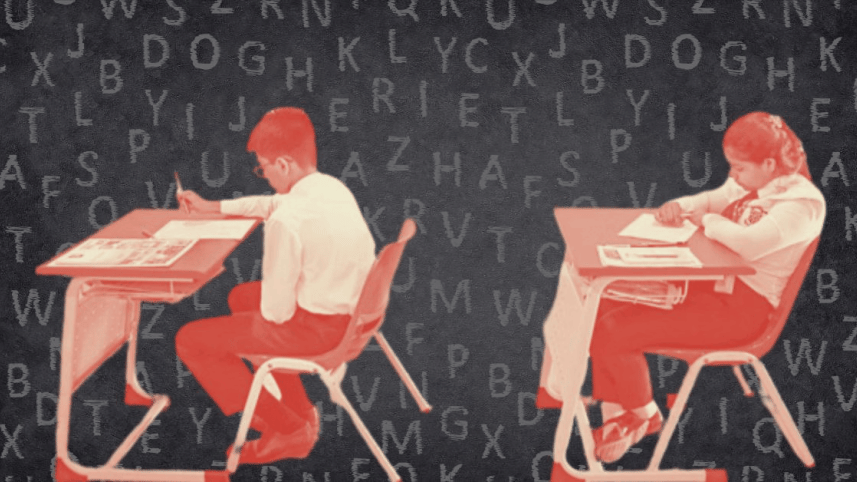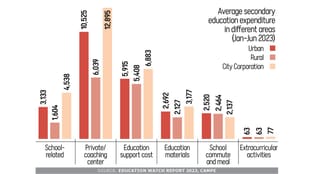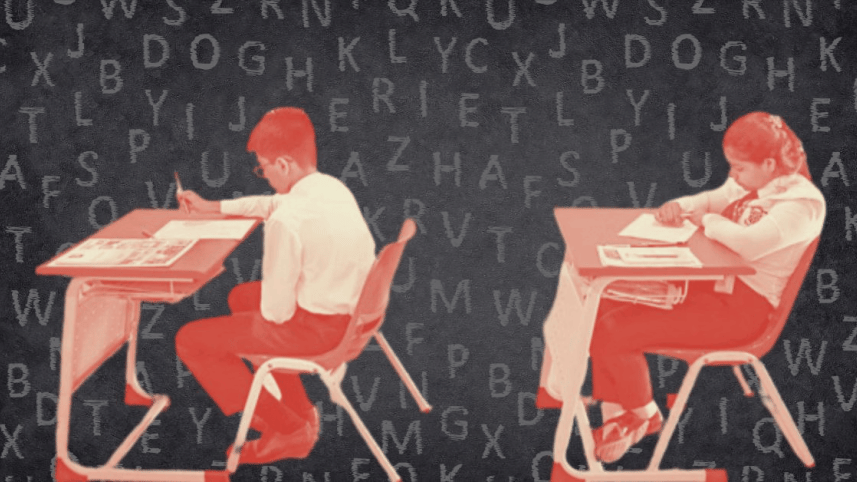Why is secondary education becoming unaffordable?

For decades, we have proudly pointed to our near-universal primary enrolment as a symbol of progress. Yet government investment has long fallen short, pushing families to absorb rising costs, especially in secondary schooling. While there has been a slight increase in allocation in this year's budget, it is still too small to ease the crushing out-of-pocket expenses that parents continue to bear.
Only 12.1% of the budget is allocated to education, with just 6.02% for secondary and higher education—barely 3% even if half of it reaches secondary schools. Families now shoulder rising costs to keep children in school, making what was once accessible a struggle for survival.
Why the cost keeps rising
According to the UNESCO 2021/2022 Global Education Monitoring Report, families bear 71% of the total education cost out of pocket in Bangladesh.
"Even in government-supported schools, families pay various fees — administrative charges, education materials, and more," explained Dr Manzoor Ahmed, professor emeritus at BRAC University and adviser to the Campaign for Popular Education (CAMPE). He pointed out that the lion's share of out-of-pocket expenses is caused by private tutoring, which is considered almost compulsory due to inadequate classroom learning.
Dr Mahboob Morshed, Associate Professor at Dhaka University's Institute of Education and Research (IER), noted, "When students don't receive proper instruction in school, parents turn to coaching centres. This has become one of the biggest expenses for families at the secondary level."

Transport, lunch, uniforms, and guidebooks — often pushed by tutors — also add to costs. "My driver's daughter, who is only in Class 9, had to spend about Tk 1,200 on books alone at the start of the year," mentioned Dr Ahmed.
Inflation and rising poverty are further pushing secondary education out of reach, according to him. "About 28% of the population lives below the poverty line, and perhaps another 20% is hovering barely above it. For these families, secondary education has simply become unaffordable. Overall, the cost of secondary schooling has become a major concern," he added.
The price we're paying for soaring cost
The soaring costs are turning secondary education into a secondary priority, overshadowed by the daily struggle for survival. To put this into perspective, in 2022 the minimum monthly wage was just Tk 8,000 for garment workers and Tk 3,600 for tea workers. Even after rising to Tk 12,500 and Tk 5,100 respectively in 2023, these wages remain far below what many families spend on a single child's secondary education. And these figures reflect only two low-wage sectors — what about the countless informal workers, day labourers, and low-wage earners who earn even less? How are their children expected to continue schooling?
The consequences are profound. Early school dropout is increasingly common, pushing adolescents into the labour market and many girls to early marriage. Enrolment in general secondary schools is declining sharply, with many families turning to the less expensive madrasa education, especially to the Qawmi system.
A unified, free, compulsory secondary system, experts say, would reduce reliance on private tutoring and ensure teachers' accountability and financial security. When well-to-do families rely on public schools, they naturally push for higher quality, better funding, and stronger oversight, benefiting all students.
Dr Rasheda K. Choudhury, Executive Director of CAMPE, noted that it's a good thing that the demand for education has been established across all classes, "Even if you ask a rickshaw puller he will tell you that he'd like to educate his children. But the question now is where and how, given the rising costs?"
Many madrasas offer meals and boarding, providing an alternative for families priced out of general schools. However, experts suggest that a balanced mix of religious and mainstream education, with proper coordination, is essential.
Is nationalisation too much to ask for?
The government is obligated to provide free primary education, but no such mandate exists for secondary schooling — an inequity experts say must urgently change. "The cost of secondary education has become simply too expensive, especially for lower-income households. We need a state-managed system. This is already a government commitment under the SDGs, which call for publicly funded education up to Grade 12," said Dr Chowdhury.
Government presence in secondary schooling remains minimal because public secondary schools are few. "Even though the government provides some support to MPO schools, we need long-term thinking here — more budget, regular and supportive supervision and accountability measures," said Dr Morshed. He added that increasing the budget ultimately depends on political priorities: "This is about long-term investment versus short-term gain. If nationalisation is a consideration, the budget obviously needs to increase."
Yet spending efficiently is equally critical. "Even though our education budget is small, a good chunk remains unused. We must spend it impactfully," he noted.
A unified, free, compulsory secondary system, experts say, would reduce reliance on private tutoring and ensure teachers' accountability and financial security. When well-to-do families rely on public schools, they naturally push for higher quality, better funding, and stronger oversight, benefiting all students.
What can we do now?
In October 2025, the Ministry of Education formed a 10-member committee to address persistent challenges in secondary education. "We've held a workshop to pinpoint the problems and may conduct research. Based on our findings, we aim to deliver recommendations within three months," said Dr Ahmed, the committee's convener.
Field visits are planned for December. "We'll meet students, guardians, teachers, and district and divisional education officers to gather ground realities and suggested solutions, and expect to submit the report in January," said Dr Morshed, a member of the committee. Both experts support nationalisation, though no concrete government plan exists yet.

Experts call for the following key measures to address the current challenges:
• Free education at least up to Grade 8 to ease financial pressure on families. Primary education alone is often insufficient, students need access to at least Grade 8 to pursue trades, skills, or higher education opportunities.
• Adopt need-based budgeting, with stronger monitoring and outcome-linked accountability. Prioritise regions where students face the greatest challenges; areas such as the haor or hill tracts may require greater budgetary support than urban districts.
• Recruit trained, qualified, and motivated teachers whose preparation aligns with the psychological and developmental needs of secondary-level adolescents. To attract talent, teaching must offer both social dignity and financial stability.
• Improve monitoring with consistent classroom supervision and feedback loops to strengthen teaching quality.
Miftahul Jannat is a journalist at The Daily Star and can be reached at miftahul@thedailystar.net
Send your articles for Slow Reads to slowreads@thedailystar.net. Check out our submission guidelines for details.




 For all latest news, follow The Daily Star's Google News channel.
For all latest news, follow The Daily Star's Google News channel.
Comments